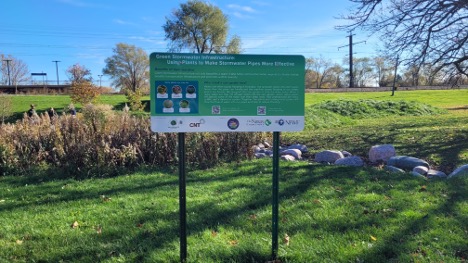Exploring Riverdale’s Conservation Projects
This tour took place on November 8, 2024 as part of an ongoing series of site visits in collaboration with the Calumet Stormwater Collaborative (CSC). This visit highlighted several key projects in Riverdale, IL that have been supported by the Greater Chicago Watershed Alliance (GCWA) in collaboration with Friends of the Chicago River.

A Tour of Collaboration: Exploring Riverdale’s Conservation Projects
As we approach the end of 2024, the Calumet Stormwater Collaborative (CSC) hosted its final site visit of the year, marking a significant moment of reflection and forward momentum. In partnership with Friends of the Chicago River, this tour was an opportunity to highlight how our goals intersect and showcase the power of networks in driving impactful stormwater management projects. Together, we explored three transformative initiatives in Riverdale, showcasing how collaborative efforts can turn vision into reality.
Stop 1: ComEd Prairie Program

Illustration by Bruce Bondy
Our journey began with an upcoming project through ComEd’s Prairie Program in Riverdale, an inspiring project converting 45 acres of utility right-of-way into a thriving green space. This initiative, supported by ComEd, Friends of the Chicago River, and UIC’s gROWing Chicago Habitat initiative, aims to restore the area from simple turf grass to native plantings, nature trails, and learning gardens in coordination with the local school district. Over the next three years, the project will enhance biodiversity and create accessible recreational spaces for the community. Notably, ComEd’s phased approach ensures progress even if external grant funding faces delays, demonstrating their commitment to ecological resilience.
Stop 2: Kickapoo Woods Restoration

Our second stop brought us to the restored landscapes of Kickapoo Woods. Friends of the Chicago River and the Forest Preserve District of Cook County have revitalized this green space to improve habitat quality and increase climate resilience. The project began with feasibility studies and community input, leading to the planting of water willow and other native species along the riverbanks to prevent erosion and support aquatic life. A unique feature of this restoration is its emphasis on community engagement, with volunteers participating in stewardship activities like canoe-based planting. These efforts have transformed Kickapoo Woods into a vibrant space for both wildlife and local residents, promoting a sustainable future for the region.
Stop 3: Pekny Park Rain Garden

Our final stop was the Pekny Park Rain Garden, a testament to community-driven design. Located near the Ivanhoe Metra Commuter Station, this project addresses localized flooding by incorporating diverse pollinator species and stormwater management solutions. Funded through grants from the National Fish and Wildlife Foundation (NFWF), Cook County, and The Nature Conservancy, the garden not only mitigates flood risks but also enhances neighborhood green spaces. Community members played a crucial role in shaping this garden, reflecting their vision for a space that connects them to nature. Pekny Park stands as a StormStore demonstration project, showcasing innovative solutions to urban flooding challenges.
The Power of Networks: CSC’s Transition to GCWA
The tour concluded with engaging discussions on CSC’s transition to the Greater Chicago Watershed Alliance (GCWA). This shift signifies an exciting new chapter, where CSC can leverage the expansive network led by Friends of the Chicago River to enhance its reach and amplify its collective impact. The Watershed Alliance, formed in 2020, serves as a collaborative forum for practitioners working to advance green infrastructure and nature-based solutions in the Chicago-Calumet River watershed region. The Watershed Alliance’s partners align around a shared vision for greater watershed-wide collaboration aimed at improving community and environmental health.
Through the expertise, coordination, and resources developed within this coalition—such as the project prioritization analysis from the Natural Solutions Tool — the Watershed Alliance has helped capture at least $8M in grant funding for regional partners since its formation. This funding emphasizes investments that deliver maximum co-benefits in areas of greatest need, including opportunity areas in the Calumet region.
The collaborative projects we witnessed today are a powerful demonstration of the value of strong partnerships in advancing regional resilience efforts. We are excited about the opportunity to amplify our collective power by uniting the CSC under the umbrella of the GCWA. To get involved with the new iteration of CSC as part of the GCWA, please email tmurray@chicagoriver.org.
A heartfelt thank you to Friends of the Chicago River for leading this insightful tour and for being a steadfast partner in these transformative initiatives.
See our other 2024 tours
- Site Visit #1: The Multi-benefit Value of Stormwater Management Infrastructure
- Site Visit #2: A Journey Through Calumet City’s Stormwater Resilience
